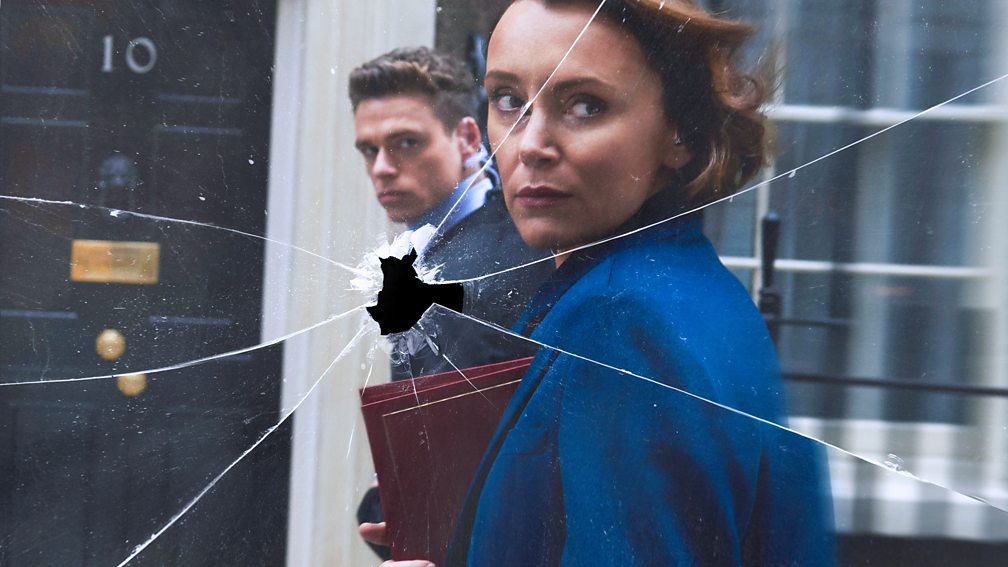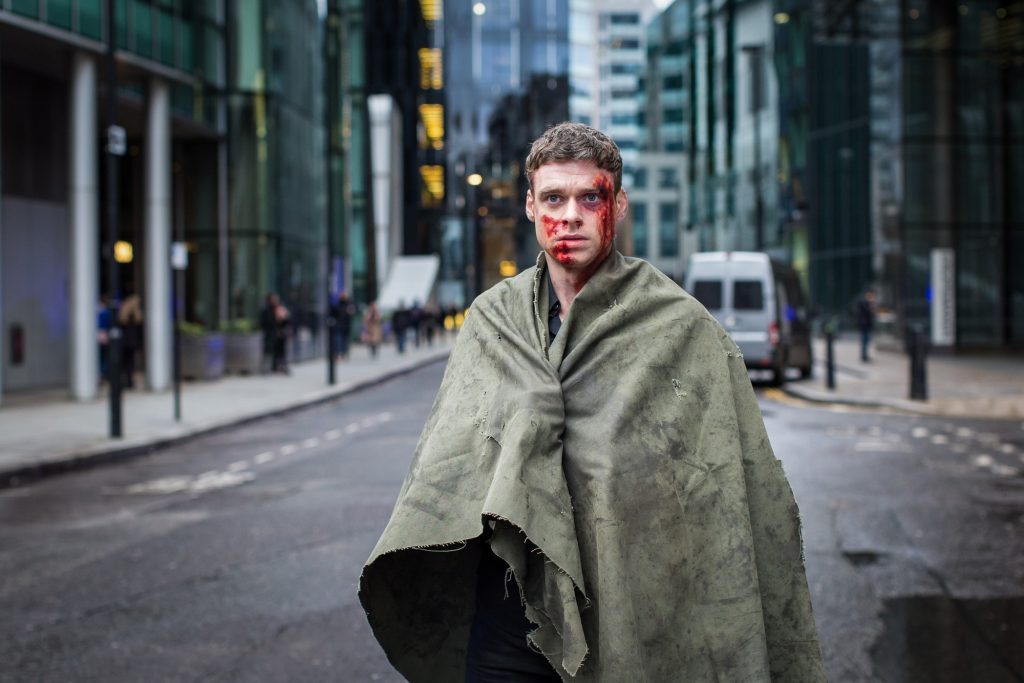By Katy Parry

British ‘showrunner’ Jed Mercurio has recently scored yet another ratings success with Series 6 of Line of Duty (BBC1, 2021), gaining almost 10 million live viewers with its opening episode on 21 March. The police corruption drama has become so embedded in UK culture that the anti-corruption ‘gaffer’ Superintendent Ted Hastings was even name-dropped at Prime Minister’s Questions by Labour leader Sir Keir Starmer, who called on the AC-12 boss and his team to ‘get to the bottom’ of Government sleaze. Prime Minister Boris Johnson retorted that the government were ‘getting on with rooting out bent coppers’, in a rather illogical follow-up.
This awkward exchange shows how popular and political culture become intwined in politicians’ efforts to display their cognisance with the latest popular media trends. This blogpost introduces my article soon to be published in the New Review of Film and Television Studies, in which I discuss another Jed Mercurio drama, Bodyguard (BBC1, 2018). Broadcast between series 4 and 5 of Line of Duty, this hit political thriller not only focused on the police force as an institution, but situated its action in the nexus of government, counter-terrorism policing and organised crime.
“Fictional portrayals of politicians, police forces and the military matter, in the sense that they can shape perceptions of national threats, political corruption, and legitimate forms of authority.”
Combined with factual coverage, popular dramas shape public perceptions of what makes a ‘good’ public servant. The two primary lenses through which I examine Bodyguard are the interlinked notions of ‘public service’ and ‘post-militariness’. Again, these are themes with current and enduring resonances.
First, the scandal that Starmer and Johnson were discussing at PMQs concerned former ministers or civil servants employed to lobby government on behalf of commercial interests. Expressly, it was sparked by former prime minister David Cameron’s lobbying current ministers on behalf of Greensill Capital for access to a Covid-related government-backed loan scheme. Much of the media commentary invoked the principles of integrity and honesty in public service, especially as no ‘codes of conduct’ were said to have been broken officially. As Andrew Rawnsley wrote in the Observer on 18th April, there is a sense of ‘something rotten about how we are governed’, embroiling both politicians and civil servants in the murky world of buying influence. This comes on top of what has already been dubbed the shameless ‘chumocracy’ of the current Johnson government.

Second, the esteem in which military veterans are held in British society is both conspicuous and constrained. It is conspicuous in that those who have served their country in the armed forces, and in some cases sacrificed their lives or health ‘for Queen and country’, are held as the ultimate heroes. But it is constrained in the selectivity of the revered values associated with an ideal (post)-military identity and ‘soldier hero’ figure (Dawson, 1994): via notions of patriotism, nationalism and martial masculinity. Veterans expressing anti-militarist views or challenging the very legitimacy of war often struggle to be heard in the wider mainstream mediascape. For a recent example of how these discourses of service collide, we can look to the prevailing themes in the coverage for the recent death of Prince Philip, Duke of Edinburgh. His ‘devoted’ service to the Queen and institution of the monarchy, alongside his military service during the Second World War, became the predominant themes in the global media commemorations. As stated in political magazine The Hill, he ‘exemplified a greater generation of service and duty’.
Despite a scaled-down funeral due to Covid-19, the event itself was brimming with military pageantry, with the tri-service band playing in the Quadrangle of Windsor Castle and gun salutes across the UK nations. Prince Philip’s coffin was lowered into the Royal Vault complete with military regalia, his naval cap and sword lain on top, as buglers of the Royal Marines sounded the naval call to arms, Action Stations. The close ties between the monarchy and armed services were strikingly on display, in even more spectacular fashion following a year that had been stripped of ritual and ceremony due to Covid-19.
What does all this have to do with a political thriller broadcast in 2018? My contention is that national cultural imaginaries are strongly indebted to values associated with standards in public life and military service. Institutions of government, police and the armed forces can be sources of national pride or disgrace; bodies able to exert power over citizens and subjects through governing authority and legitimate use of force. For the UK, recent wars have been fought at a distance, but the impact of the domestic and foreign policy conducted under the rubric of the ‘war on terror’ continues to be felt, most keenly by the veterans of Iraq and Afghanistan and their families. The stories we tell, and the identities and memories constituted through retellings across popular media genres, are a significant element of our social culture.
Jed Mercurio’s Bodyguard (2018) could be dismissed as an unrealistic sensational thriller, but I argue that it deals with some of these pertinent issues, primarily through its protagonist, PC David Budd (played by Richard Madden). David Budd is a handsome and brave police protection officer serving the Home Secretary, but he is also a veteran of Afghanistan displaying symptoms of complex PTSD (post-traumatic stress disorder).

Underlying my analytical approach to Bodyguard is an investment in the significance of drama and popular culture in politics. Fictional portrayals of politicians, police forces and the military matter, in the sense that they can shape perceptions of national threats, political corruption, and legitimate forms of authority. In the forthcoming article, I draw upon the academic literature on crime and political dramas, which provides insights into the ways fictional narratives both affirm the authority of institutions and explore social anxieties (McElroy, 2017), alongside popular geopolitics and feminist International Relations theory which also place an emphasis on the aesthetics in such cultural artefacts (Shepherd, 2013).
Bodyguard was broadcast weekly on BBC1 on Sunday nights from 26 August-23 September 2018. The key protagonists are defined by the nature of their public service – whether as former soldiers, police officers or politicians. Of particular interest to me was the way in which lead character David Budd’s PTSD, following his experiences as a soldier in Iraq and Afghanistan, is deployed as a dramatic device to convey not only his own fractured psyche but to signal the vulnerability of a nation state facing multiple and opaque threats. The eponymous bodyguard in this series is not only a Personal Protection Officer assigned to the Home Secretary following his brave thwarting of a terror attack, he is also an ex-soldier: physically, morally and mentally injured by his combat experiences.
I discuss how the war veteran has become a familiar dramatic trope in popular media, and how, in this case, the persistence of military identity for veterans, or ‘post-militariness’ (Parry and Thumim, 2017), is aligned with embodying both masculinised decency in the face of institutionalised corruption, but also a (self-)destructive and violent ambivalence. I argue that post-militariness offers an insightful analytical lens because it recognises the complex dialectical tension between military experience coded as both a source of pride and of trauma, and post-military identity as signifying both an enduring commitment to public service and as embodying a sense of betrayal.
The ‘9/11 wars’ have led to renewed portrayals of the war veteran, whether in the media, theatrical productions, museum displays, or novels and memoirs. In such cultural productions, the veteran is often constructed as a culturally contested and politically charged figure, alongside broader concerns about militarism and ‘hero-fication’ of military personnel and values (Kelly, 2013). Fictional portrayals of the war veteran offer a personalised and emotionally charged representation, often attracting large audiences, as was the case with Bodyguard.

Post-militariness provides an analytical lens that not only examines how troubling normalisations of military values in civilian life are mediated in popular culture (militarisation); it looks at how the impacts of war training and war experience persist in fictional veteran bodies who are depicted as carrying their former military identity and martial masculinity into civilian spaces. Popular culture provides a resource for exploring how the dialectical tensions of pride and trauma are imagined in the portrayal of transitioning from militariness to post-militariness.
My article’s analysis of Bodyguard is thematically organised into sections about the discursive contexts (Brunsdon, 2017) of the anti-terror state and three interconnected features of post-militariness: the veteran as a dangerous threat, as needing help for trauma and injuries, and as embodying an enduring commitment to public service. In a life-or-death moment in the final episode, David Budd says, “I’ve been a soldier, I’ve been a copper. You get to spot a bloke whose word’s his bond”. In this scene, the drama offers a measure of reassurance when it comes to the good character of ‘blokes’ who share a commitment to ‘what’s right’ and the pursuit of justice, even when that puts them at odds with their superiors.
Jed Mercurio’s dramas revolve around the world of work, often identifying institutional problems in services such as the NHS or police force, whilst examining wider ethical and socio-economic issues through complex and intricately absorbing plots. Such popular fictional programmes are also political; they explore how power corrupts, how martial hyper-masculine ideals are harmful on a personal and collective level, and how the virtues of public servants are tested when lives are in danger. Accompanying a fictional character through their moral failures and poor decisions can enhance the audience’s empathetic engagement, and I would argue, their understanding of the consequences of domestic and foreign policies.
I hope you will find my upcoming article in NRFTS a useful contribution to thinking about how such popular culture artefacts characterize contemporary and enduring political concerns at the heart of public life.
Read Katy Parry’s OpenAccess article “Representing public service and post-militariness in Bodyguard (BBC, 2018)” in our Summer 2022 issue (20.2).
References
Brunsdon, C. (2017) Bad sex, target culture and the anti-terror state: New contexts for the twenty-first century British television police series, in McElroy, R. (ed), Contemporary British Television Crime Drama, Oxon: Routledge, pp. 27-39.
Dawson, G. (1994) Soldier Heroes: British adventure, empire and the imagining of masculinities. London: Routledge.
Kelly, J. (2013) Popular Culture, Sport and the ‘Hero’-fication of British Militarism. Sociology, 47(4): 722–38.
McElroy, R. (2017) Introduction, in McElroy, R. (ed), Contemporary British Television Crime Drama, Oxon: Routledge, pp.1-24.
Parry, K. and Thumim, N. (2017) ‘When he’s in Afghanistan it’s like our world/his world’: mediating military experience, Media, Culture & Society, 39(1): 29–44.
Shepherd, L. (2013) Gender, Violence and Popular Culture: Telling Stories. London: Routledge.

